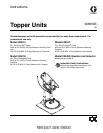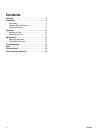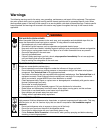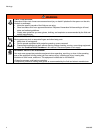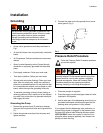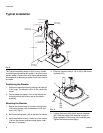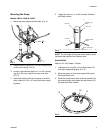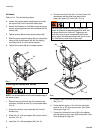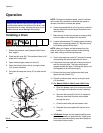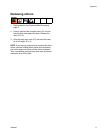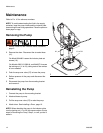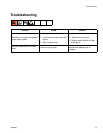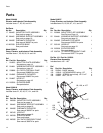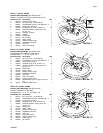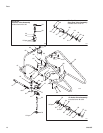
Installation
306556S 5
Installation
Grounding
• Pump: Use a ground wire and clamp as shown in
Fig 1.
• Air and fluid hoses: Use only electrically conductive
hoses.
• Air Compressor: Follow manufacturer’s recommen-
dations.
• Spray fun and dispensing valve: Ground through
connection to a properly grounded fluid hose and
pump.
• Fluid supply container: Follow your local code.
• Truck bed or platform: Follow your local code.
• Solvent pails used when flushing: Follow your local
code. Use only metal pails, which are conductive,
placed on a grounded surface. Do not place the pail
on a nonconductive surface, such as paper or card-
board, which interrupts the grounding continuity.
• To maintain grounding continuity when flushing or
relieving pressure: Hold a metal part of the dispens-
ing valve firmly to the side of a grounded metal pail,
then trigger the valve.
Grounding the Pump
1. Remove the ground screw (Z) and insert through
the eye of the ring terminal at the end of ground wire
(Y).
2. Fasten the ground screw back into the pump and
tighten securely.
3. Connect the other end of the ground wire to a true
earth ground. (Fig 1).
Pressure Relief Procedure
Follow the Pressure Relief Procedure whenever
you see this symbol.
1. Close the pump’s air regulator.
2. Close the supply pump’s bleed-type master air valve
(required in this system).
3. Hold a metal part of the dispensing valve firmly to a
grounded metal waste container and open the dis-
pensing valve until pressure is fully relieved.
If you suspect that the dispensing valve, extension, or
grease fitting coupler is clogged, or that pressure has
not been fully relieved after following the steps above,
VERY SLOWLY loosen the coupler or hose end cou-
pling and relieve pressure gradually, then loosen com-
pletely and clear the clog.
The equipment must be grounded to reduce the risk
of static sparking and electric shock. Electric or static
sparking can cause fumes to ignite or explode.
Improper grounding can cause electric shock.
Grounding provides an escape wire for the electric
current.
FIG. 1
This equipment stays pressurized until pressure is
manually relieved. To help prevent serious injury from
pressurized fluid, such as skin injection, splashing
fluid and moving parts, follow the Pressure Relief
Procedure when you stop spraying and before
cleaning, checking, or servicing the equipment.
Y
Z



